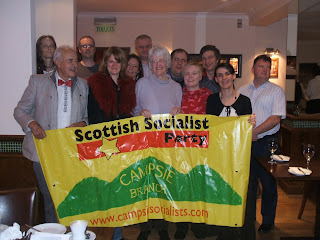“You have no idea, really, of how profound this moment is for us.”
The words of Alice Walker in her open letter to Barack Obama.
“Us being the black people of the Southern United States.”
Scottish Socialists would do well to remember we are looking on at events through a prism of white privilege.

It is easy for us to dismiss the symbolic power of a black president as another mainstream Democratic victory but I would argue that this would be missing the point and a serious own goal.
On a personal level I know how I felt when Frances, Carolyn and Rosie were elected. I felt validated as a working class woman. It mobilised me to join the SSP.
I can only imagine what it must mean to African Americans to see a black man enter the Whitehouse - built by their ancestors in chains. Who Alice Walker hopes ‘knew he was coming’ because ‘ancestors have to take a very long view’ and have to live on in faith in the struggle.
The symbolic significance of the most famous black person in the world being a U.S. President and not an entertainer or a sportsperson hit me when I saw a young teenage black girl was so overwhelmed by emotion on television that she expressed through sobs that she never thought she’d live to see the day.
There is no denying it must be a moving affirmation of the significance of the horror of the black struggle and where her ancestors came from.
She must be walking tall for the very first time.
It is not abstract theory or politics, it is personal and real. Real people’s experiences are tangled up in this. People have heard their families talk of slavery. Lynchings are in living memory.
It is personal and emotional. Perhaps that is why poetry has expressed it’s significance better than political discourse.
Poetry in motion – Part of the relay race…
More recently, Katrina embodies how much African Americans have borne the brunt of the last reactionary eight years. Subsequently the symbolic power of a black president cannot be dismissed as worthless.
African Americans do not need anyone to tell them - least of all white leftists- that their struggle is not over or that Obama is not their Messiah but a mainstream Democrat who may well end up reactionary.
This does not diminish their achievement. The torch has been passed – that is all.
The struggle continues…
Nevertheless, a black presidency has captured the imaginations of people all over the world and Scottish Socialists dismiss this at our peril. Consciousness is changing. We can easily sniff at it in our ivory towers, but to do so would be to abandon those progressive voices of struggle to cynicism, and apathy. We must ask ourselves- if we are honest - where is the left’s alternative?
I for one realise that no president of the United States is likely to be a standard bearer for the left. Obama himself is of little interest to me as a Socialist. Yet I understand it is remarkable that a grassroots organisation has galvanised so many for the forces for progress in America.
It may not be the Socialist Revolution I would want but we have to address the reality as it is not what we would like it to be. Otherwise we are abdicating our historic duty to seize the day.
We need to admit that the left has never been weaker. The U.S. left in particular has been decimated in the past 30 years. I would argue that we only have an opportunity to rebuild it by engaging with these newly mobilised groups in a long and difficult process. This is much more productive than dismissing them as misguided.
We need to stop congratulating ourselves on our correct analysis and reach out to what is actually happening around us if we are to stop being an irrelevant sect in the U.S. but also in Scotland.
Obama’s symbolic victory has the potential to be truly consciousness changing. Rather than dismissively arguing that the victory means more of the same ole same ole we must recognise it as an historic opportunity for previously dispossessed groups to engage and really put the pressure on. We can use Obama’s rhetoric as well as the new technologies he has used to great effect during the campaign against him to organise. For the white left to do otherwise would be to abandon any future hope of real change in America.
One of Barack’s supposed mentors is Saul Alinksy, who said that ‘a good tactic was one that your people enjoy’. People are enjoying this small victory. We should stop being churlish and join the party! They do not need to be told of the white Marxist alternative. Black activists already know this and will continue to protest. They do not look to anyone else to solve their problems.
We will win or lose by struggling together.
In the words of the campaign slogan” We are the people we have been waiting for!”
http://www.poemhunter.com/poem/still-i-rise/





















